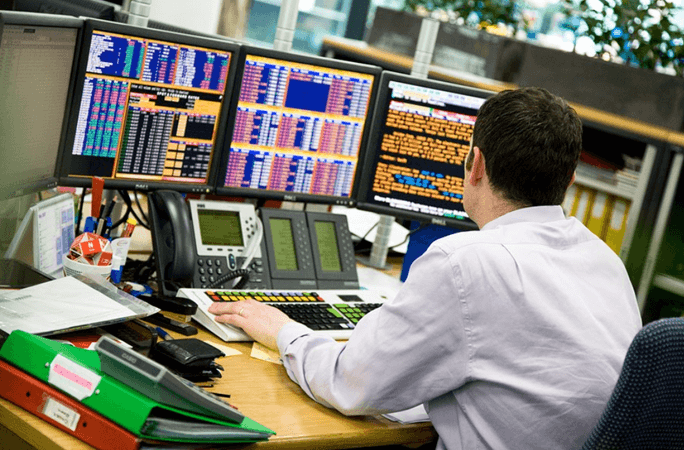What Is Day Trading? (Description & Key Terms)
The glamorous image of stock traders and of the stock market in general is of people in suits making huge sums of money in a short period of time. Anyone with a basic understanding of investing knows that throwing all your money into risky bets and hoping to become a millionaire in a month is unrealistic and not a smart strategy.
The rule of thumb is to regularly invest in a diverse number of assets for sustainable, long-term growth.



Image Source: Day Trading Guide
That said, there are people who do make a large amount of money in a short period of time through investing. They are a controversial group viewed by their peers either as bold investors or risky gamblers: day traders.
Those involved in day trading stocks are also known as speculators. Stock traders involved in speculating buy a large amount of stocks and sell them within the same day. Day trading for a living involves very rapid trades during the day. Assets are rarely held overnight.
What Is Day Trading? (Going Long & Short)
To understand how day trading stocks works, it is important to know two key things: what going long or short is.
Despite what their names suggest, these two terms have nothing to do with how long you plan on holding securities. As mentioned, you’re holding them for a significantly short period of time. Instead, they refer to what you think will happen to their prices.
Frankly, knowing how to day trade means knowing how to place good bets. These days, however, stock traders involved in day trading use technology to analyze stocks.
When an investor who is day trading stocks goes long, it means he/she thinks the price of a security will go up. If Company A is selling shares at $10 a piece, and our day trader thinks the stock will go up, he/she will buy a bunch. If the prediction is correct and the stock goes up to $12 a piece, the investor will sell his/her shares and make a profit of $2 per share.
If, on the other hand, the price goes down to $8, the investor will lose $2 instead. Most speculative stock traders tend to go long because there is a limit on how much you can lose. You can only lose the amount of money that you put in.
Going short, or shorting, is considered a riskier bet. This is because you could lose way more than you put in. Stock traders selling short are betting that the price of a security will fall. In order to profit off of this, they do the following.
Let’s return to Company A and its $10 shares. If our investor who is day trading stocks believes the price of Company A’s shares will fall, he/she will borrow those securities from a broker and pay interest for the time he/she borrows them.
Our investor will go to the market and sell them for $10 each. If the price falls as expected, then he/she is in business. Say the price falls to $7. The investor will go into the market, buy them up for $7, return the borrowed stocks to the broker, and collect a profit of $3.
All-in-One Change Management Tools
Top Rated Toolkit for Change Managers.
Get Your Change Management Tool Today...
Stock traders who sell short are engaged in risky business because if, for example, the stock price goes up, you are now required to cover the cost. If the price of Company A’s shares went up to $12 instead, you would now be losing $2 a share to buy them back that so you could return the securities to your lender.
Some people hang onto the securities in the hopes that they will perform the way they were betting on while other stock traders will simply cut their losses before the stock price goes any higher. As you can see, the losses can be astronomical if the person who is day trading stocks chooses to hang onto them and they still perform contrary to their expectations.
Technically, there is no time limit, but since interest is charged on borrowed stocks, it is in the stock traders’ best interests to close as quickly as opposed to hanging on to short sells.
Don’t Miss: Tips on Passing the Certified Financial Planner (CFP) Exam
Stock Traders Engaged in Betting with Borrowed Money (Margin Trading and Margin Calls)
In some cases, stock traders speculate with borrowed money. People borrow money all the time, in the hopes of profiting in the long run. When you open a business, you receive a loan and hopefully make more than the amount you borrowed. If you waited until you had saved up all the money needed to start the business, you would never get started.
Day trading stocks on borrowed money is risky, but if stock traders get it right, they are in for a big payday. When you open an account at a brokerage firm, you can choose to open a cash account or a margin account. It’s pretty simple.
For instance, if you decide to go long, the money in your cash account will be used to execute the purchase. If the stock price goes down, you’ll lose money, which is never fun, but at least you’ve only lost money you actually have.
Alternatively, you can purchase securities and conduct day trading for a living by using borrowed money in a margin account. In this case, your broker loans you the money that you use to place your bets.
Leveraging the large sum of money you can borrow for day trading stocks is either a path to great rewards or a recipe for disaster. If you go long and the stock price falls, not only was your prediction wrong, but you now have to find the money to pay your lender back.



Image Source: How to Be a Day Trader
The broker’s loan is collateralized by the securities stock traders purchase and, depending on the broker, a certain percentage of cash. If you go long and the stock prices start to fall or market factors indicate things will go south, your lender may make a margin call.
This means the broker will require the stock trader to present more collateral, pay more cash towards the account or get rid of some of those securities.
Related: How to Become a Mortgage Broker (Completed Guide: Requirements, Income, Broker Licence…)



How to Day Trade (Strategies, Techniques, and Technology)
Perhaps the “go big or go home” nature of day trading does not faze you, and you’re still wondering how to become a day trader. Fair enough. Understanding how to trade stocks as a speculator has the potential for big rewards.
The first thing to understand is that, even though there are success stories about day trading stocks, for the most part, these individuals have a solid understanding of how the markets work. Without a solid understanding of the stock market, day trading is just another way of gambling.
Day trading stocks also requires a significant amount of capital that you can afford to lose. Just because you have the money to invest does not mean you can afford to invest. There’s an important difference.
Typically, stock traders involved in day trading work for larger firms, but the Internet has made learning how to day trade and carrying such trades out much more accessible to the individual investor. Even so, individual investors are at a disadvantage compared to day traders working for large corporations who have access to highly superior analytical software.
Additionally, stock traders at actual financial institutions have access to a dealer desk, which allows them to carry out trades instantaneously. For a day trader, timing is everything. Moreover, this makes day trading stocks way before individual investors have a chance to react much easier.
How to Day Trade as an Individual
If you decide to figure out how to start day trading, you will need to open a trading account so that you can conduct these trades from home. You can do this through your financial institutions if they offer online trading accounts or use one of the purely online-based options available. A few popular companies for day trading stocks are:
It is hard to determine which platform is best since this is better determined on a case-by-case basis. Picking a platform for day trading stocks requires consideration of a trading account’s features, the commission rates, and an understanding of the kinds of securities you are trading in.
Additionally, be wary of any possible scams. There are many companies that prey on consumer desire for get-rich-quick schemes by encouraging people to make unwise moves like using credit cards to benefit from their platform’s trading tools. Bet what you can afford to lose, and take any promises to make you a fortune in a short period of time through day trading stocks with a grain of salt.









How to Start Day Trading (Fundamental and Technical Analysis)
Understanding how to trade stocks in a profitable way requires strategy. Generally speaking, investing analysis can be divided into two main categories: fundamental and technical.
Fundamental analysis requires an understanding of a company’s health and performance. A stock investor will consider a company in the context of its management team, its competition, how much money it’s making (profits), and its growth potential.
Analyses such as these can be carried out by anyone through publicly available information, but, naturally, the sophistication of such an analysis depends on the abilities of the investor.
Additionally, a fundamental analysis takes a bit more time on the part of the stock investor because a thorough amount of research is required. It takes time to look at a company’s financial statements, looking at its assets and liabilities.
This strategy is not well-suited for investors who are day trading stocks because they are aiming to profit from short-term price fluctuations. Additionally, there is a lot of ambiguity in trying to predict how certain news events will affect market prices. While it is definitely important to be able to carry out a fundamental analysis of companies, day trading for a living requires more technical analysis.
Simply speaking, technical analysis involves examining charts and acting in response to patterns. In this case, an investor engaged in day trading stocks is not examining a company’s financial health and long-term performance because they are more interested in short-term changes. The sophistication of the analytical tools a day trader has depends on the resources at their disposal.
Popular Article: What Is Investment Banking? – What You Want to Know! (Definition, Types & Basics)
How Do Day Traders Make Money? (Day Trading for a Living)
It’s clear that day trading stocks is not part of the long-term investing school of thought. Stock traders engaged in speculating are in it for the potential profit and engage in day trading for a living. For every success story, though, there are loads of people who have lost a lot of money. One study reported that 70% of day traders lose money.
Extremely talented stock traders often end up opening their own firms or hedge funds. In this case, they manage others’ money for them, but, in order for investors to access the skills of these individuals, they are required to give up a huge percentage of the profits to the hedge fund.
At the end of the day, figuring out how to start day trading doesn’t necessarily mean a person should start day trading for a living. It takes knowledge of the markets, an understanding of technical analysis, and the money to afford it.
AdvisoryHQ (AHQ) Disclaimer:
Reasonable efforts have been made by AdvisoryHQ to present accurate information, however all info is presented without warranty. Review AdvisoryHQ’s Terms for details. Also review each firm’s site for the most updated data, rates and info.
Note: Firms and products, including the one(s) reviewed above, may be AdvisoryHQ's affiliates. Click to view AdvisoryHQ's advertiser disclosures.





